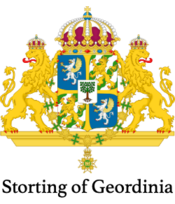Storting of the Kingdom of Geordinia
The Storting is the federal legislature of the Kingdom of Geordinia, established in 1241 by the Constitution of Geordinia. It is located on the Mall in the capital; Portland. The bicameral parliament is comprised of an upper house (The Senate) and a lower house (The House of Representatives. The Senate has 100 members, all independents by law, and the House has 450 members, and is elected every five years based on proportional representation in 450 constituencies.
The Storting passes Acts that apply in Geordinia and the Crown dependencies and overseas territories. The Storting is also responsible for adopting the nation's budgets, approving the nation's accounts, appointing and exercising control of the Government, and taking part in international co-operation. Bills may be initiated by the Government or by members of the House of Representatives. All bills passed must be presented before the Council of State to receive Royal Assent within thirty days in order to become law.
Members of the House of Representatives are called Congressmen/women and must be over the age of 25. Members of the Senate are called Senators and are appointed by the Monarch. Senators only need to be over the age of 18 and serve for life. They must also be a peer of the realm and so must have a noble title, however, in cases where an individual is nominated and doesn't have a peerage, the Sovereign will grant them one. They are appointed by the Monarch upon the advice of an independent commission and serve for life. Only upon the death of a Senator can another be appointed as their is a limit of 100 members. All members of the Senate are required to be independents in terms of political party.
For elections to the House of Representatives, Geordinia is divided into 450 constituencies, each electing a single member to the House of Representatives (Congressman or Congresswoman) by simple plurality. General elections are called by the monarch when the Statsminister so advises. After the Constitutional Ammendment in 1892, the elections are called by the Monarch every five years to occur on October 2nd. However, if a Government fails to defeat a vote of no confidence, the Government is dissolved and if no new Government can be formed, a fresh general election is called. The Statsminister retains their right to advise the Monarch about when to call an election, but this advise may only be given if the Statsminister wishes to call an early election, not if they wish to extend a term.


